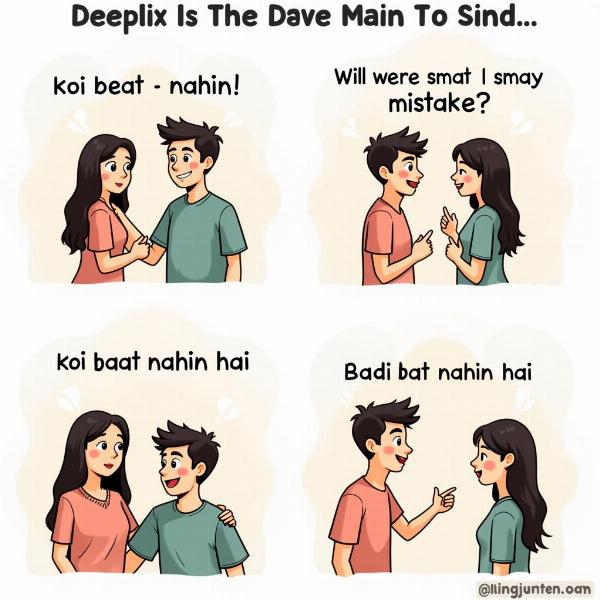“No big deal” is a common English phrase we often hear and use. But what does it truly mean in Hindi, and how is it used in different contexts? This article delves into the various Hindi translations of “no big deal,” exploring their subtle nuances and cultural implications. We’ll also look at how this phrase reflects the cultural values of both English and Hindi speakers.
Various Hindi Translations of “No Big Deal”
The Hindi equivalent of “no big deal” isn’t a simple one-to-one translation. The best choice depends on the specific context and the level of formality. Here are some common options:
- कोई बात नहीं (Koi baat nahin): This is perhaps the most common and versatile translation. It literally means “no matter” or “it’s okay,” conveying a sense of forgiveness or dismissal of a minor issue. You might use this when someone apologizes for a small mistake.
- बड़ी बात नहीं है (Badi baat nahin hai): This translates to “it’s not a big thing.” It emphasizes the insignificance of the matter and is suitable for slightly more serious situations than “koi baat nahin.”
- चिंता की कोई बात नहीं (Chinta ki koi baat nahin): This means “there’s no need to worry” and is used to reassure someone that a situation is under control or not as bad as they might think.
- फर्क नहीं पड़ता (Fark nahin padta): This translates to “it doesn’t matter” and expresses indifference or lack of concern about something. Use this when the outcome of a situation is unimportant to you.
Cultural Context and Usage
Understanding the cultural context is crucial when using these translations. In Indian culture, politeness and humility are highly valued. Using “no big deal” appropriately can demonstrate respect and consideration. For instance, if someone offers you a small gift, saying “koi baat nahin” might come across as dismissive. Instead, expressing gratitude while downplaying the gesture would be more appropriate.
“No Big Deal” in Everyday Conversations
Imagine a scenario where a friend accidentally spills some water on you. You might say “koi baat nahin,” assuring them that it’s okay. Or, if someone is worried about a minor delay, you could reassure them with “chinta ki koi baat nahin.”
 Everyday Use of No Big Deal in Hindi
Everyday Use of No Big Deal in Hindi
Formal vs. Informal Usage
While “koi baat nahin” is generally suitable for most situations, “badi baat nahin hai” can be more appropriate in slightly formal settings. “Fark nahin padta,” on the other hand, carries a more casual and sometimes even slightly rude connotation, so use it cautiously.
“No Big Deal” and Humility
In Indian culture, downplaying one’s achievements and contributions is a sign of humility. “No big deal” can be used in this context to express modesty. For example, if someone praises your work, you might respond with “badi baat nahin hai,” implying that it wasn’t a significant effort.
Conclusion
Understanding the nuances of “no big deal” in Hindi is crucial for effective communication. By choosing the appropriate translation and considering the cultural context, you can convey your message accurately and respectfully. So, the next time you want to say “no big deal” in Hindi, remember the options discussed and choose wisely.
FAQ
-
What is the most common Hindi translation for “no big deal”? Koi baat nahin is the most common and versatile translation.
-
Is “fark nahin padta” polite to use? “Fark nahin padta” is casual and can sometimes be perceived as rude. Use it cautiously.
-
How does “no big deal” reflect Indian cultural values? It can reflect humility and the tendency to downplay one’s accomplishments.
-
When should I use “chinta ki koi baat nahin”? Use it to reassure someone that there’s no need to worry.
-
Can I use “koi baat nahin” in formal settings? While generally acceptable, consider “badi baat nahin hai” for more formal situations.
-
Why are there multiple translations for “no big deal” in Hindi? Hindi has richer nuances that allow for expressing subtle differences in meaning and context.
-
Is it important to understand cultural context when using these phrases? Yes, understanding cultural context is crucial for polite and effective communication.
Meaning-Hindi.in is your one-stop solution for all your Hindi translation needs. We offer a wide range of services, including business and commercial document translation, certified and legal document translation, technical and user manual translation, website and software localization, and educational and academic document translation. Our expert team ensures accurate and culturally sensitive translations for all your requirements. Contact us today for a free quote! Email: [email protected], Phone: +91 11-4502-7584. Meaning-Hindi.in is committed to providing high-quality, professional Hindi translation services.